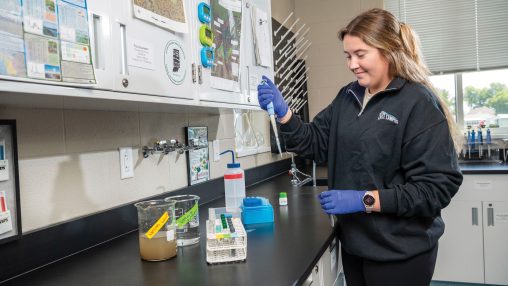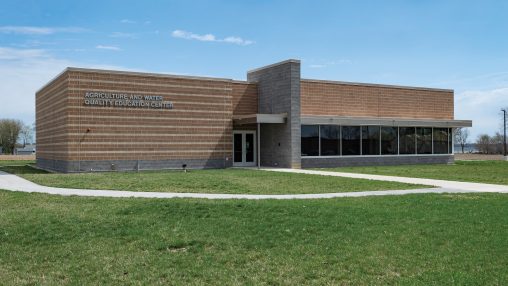
Wright State alumna Morgan Jutte studies lake water samples at the Water Quality Lab in Lake Campus’ Agriculture and Water Quality Education Center.
By Sarah Cavender ’20
Wright State–Lake Campus offers STEM students a unique hands-on research opportunity to learn more about water quality.
“Having the Water Quality Center at Wright State–Lake Campus provides a sort of home base for a lot of the research in the area that deals with water quality and a home base for teaching efforts that go on at Lake Campus,” said Stephen Jacquemin, Ph.D., professor of biology at Lake Campus. Jacquemin has been conducting water quality testing with his students at Grand Lake St. Marys and surrounding wetlands for almost a decade.
“I’m passionate about the environment, and getting students outdoors and providing hands-on experience,” Jacquemin said.
The program is a four-year Bachelor of Science in Integrated Science Studies with three tracks: pre-health, agriculture, and environmental.
“Just about all of them come through this [Water Quality Center] at one point or another to learn and understand the patterns and processes,” Jacquemin said. “We’ve had students who have finished the pre-health track and have gone on to physician’s assistant school, then on to medical school, dental school, or veterinary school.
“We’ve had students who have finished the agricultural track go more in line with soil and water conservation or USDA [United States Department of Agriculture],” he added. “And we’ve had students with the environmental earth and biological track who have gone to work in labs all around this area of Ohio.”
Morgan Jutte is one of those students who works in a lab at Lake Campus. Jutte graduated with both bachelor’s and master’s degrees in chemistry from Wright State.
“I work at the Lake Campus, but my job is a full-time technician for the LEARN H2Ohio Wetland Monitoring Program,” she explained. “The program consists of researchers from Ohio universities working together to determine the nutrient reduction efficiency of constructed and restored wetlands across the state. Because Wright State has two campuses, we cover the largest portion of the state.”
Jutte said, “I think the most exciting and important part is hands-on research experience for undergraduate students. We have a handful of undergraduate students who work in the lab year-round. They learn skills such as water and soil sampling, analytical determination of nutrients, communication, time management, and more that will really help give them the experience they need to land their first full-time job after graduating.
“Another exciting thing for me,” she said, “is growing up and living in this area my entire life and being able to contribute to the efforts being made to improve water quality in Grand Lake St. Marys and all around the state.”
For third-year student Kenneth Kline, contributing to the conservation efforts in his backyard played a role in getting involved in the program. Passionate about hiking, fishing, and kayaking, Kline reached out to Jacquemin and found the integrated science program to be a perfect fit.
“Most of my work is outside, and I get to help better the thing (nature) that I enjoy,” said Kline. “The lake here has a toxicology problem. This isn’t a problem that’s just occurring here; this is literally all over the world. And you have something to study that’s right outside of the classroom.”
Skye Wendel, a fourth-year integrated science student, grew up in Celina and became passionate about water quality and the program when it was launched in 2018.
“Growing up here gave me a passion for the lake and how it serves our community and the wildlife around it,” Wendel said. “I feel lucky to have gone to such a small college, as it gave me opportunities to get familiar with my professors and to have a close hand in the research that I find exciting.
“I started working for Dr. Jacquemin two years ago, sampling water, going to conferences, and meeting and collaborating with people in the field,” Wendel added. “I really have an interest in the connection between agriculture and water quality because of my work at the lab. I want to continue to help bridge the gap, so farmers have better access to environmental farming practices.”

The Agriculture and Water Quality Education Center sits adjacent to Grand Lake St. Marys and the future home of a 10-acre wetland project
Wendel said she hopes her degree and experience at the water quality lab will lead to a job with the Ohio Department of Agriculture, the Ohio Department of Natural Resources, or National Resources Conservation Services.
In August 2023, a 10-acre site adjacent to the Lake Campus in Mercer County was sold to the Grand Lake St. Marys Lake Facilities Authority to become the future home of a wetland that will help improve the lake’s water quality.
About four years ago, Jacquemin suggested a natural wetland site on the north side of the lake, close to the Lake Campus, which would aid with water runoff and act as a location for students to conduct research.
“It’s important,” said Jacquemin. “We are all people on this planet. We have an obligation and responsibility to leave it a little better than when we found it, and conservation efforts are the path to do that.
This article was originally published in the 2024 issue of the Wright State Magazine. Read more stories at wright.edu/magazine.

 Walking through open doors
Walking through open doors  Adventures await
Adventures await  Wright State to expand nursing facilities to meet workforce needs and prepare more graduates for in-demand careers
Wright State to expand nursing facilities to meet workforce needs and prepare more graduates for in-demand careers  Wright State student-athletes make a lasting impact on local family with more to come
Wright State student-athletes make a lasting impact on local family with more to come  Wright State names Rajneesh Suri dean of Raj Soin College of Business
Wright State names Rajneesh Suri dean of Raj Soin College of Business 